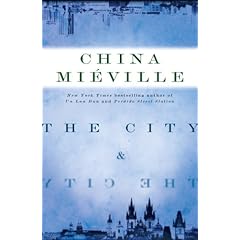
When a murdered woman is found in the city of Beszel, somewhere at the edge of Europe, it looks to be a routine case for Inspector Tyador Borlú of the Extreme Crime Squad. But as he investigates, the evidence points to conspiracies far stranger and more deadly than anything he could have imagined.
Borlú must travel from the decaying Beszel to the only metropolis on Earth as strange as his own. This is a border crossing like no other, a journey as psychic as it is physical, a shift in perception, a seeing of the unseen. His destination is Beszel’s equal, rival, and intimate neighbor, the rich and vibrant city of Ul Qoma. With Ul Qoman detective Qussim Dhatt, and struggling with his own transition, Borlú is enmeshed in a sordid underworld of rabid nationalists intent on destroying their neighboring city, and unificationists who dream of dissolving the two into one. As the detectives uncover the dead woman’s secrets, they begin to suspect a truth that could cost them and those they care about more than their lives.
What stands against them are murderous powers in Beszel and in Ul Qoma: and, most terrifying of all, that which lies between these two cities.
The book is billed as a mystery/fantasy, and that's a fitting description, though I read more fantasy than mystery, so I'm not the best person to judge it as a mystery. That's not to say the plot isn't well-constructed - just that I'm not familiar with mysteries and therefore can't rate the book as a mystery. But, as a work that resonates and makes me think, The City and the City succeeds.
The story opens in Beszel, but it doesn't take long to realize that Beszel and it's sister city, Ul Qoma, are, in parts, built upon the same geographic ground. If one was walking down a street, it would be possible to look on the left and see the citizens, buildings and mannerisms of Beszel, while seeing an entirely different city comprised of different people on the right.
But the citizens don't see each other because of Breach, a covert organization lurking between the cities. If a Beszel citizen breaches the border between cities, members of Breach descend upon the offender from nowhere.
The book's main flaw isn't so much a flaw as it is a wish for something more. The plot and the characters work, but there are times when I wished I was further inside Tyador's head. The unfolding of how the two cities works is the real meat of the story.
There are themes I wish I could expand on, but am unable to due to their spoilerish nature, among them how different sets of knowledge catalyze entire paradigm shifts in one perception, changing nothing and everything and the lengths people will go to hold fast to the cognitive biases they have formed. And I get the feeling that these are only some of the things the book brings to light - it's very complex and promises to reward re-readings. And I can't wait to read it again.

No comments:
Post a Comment